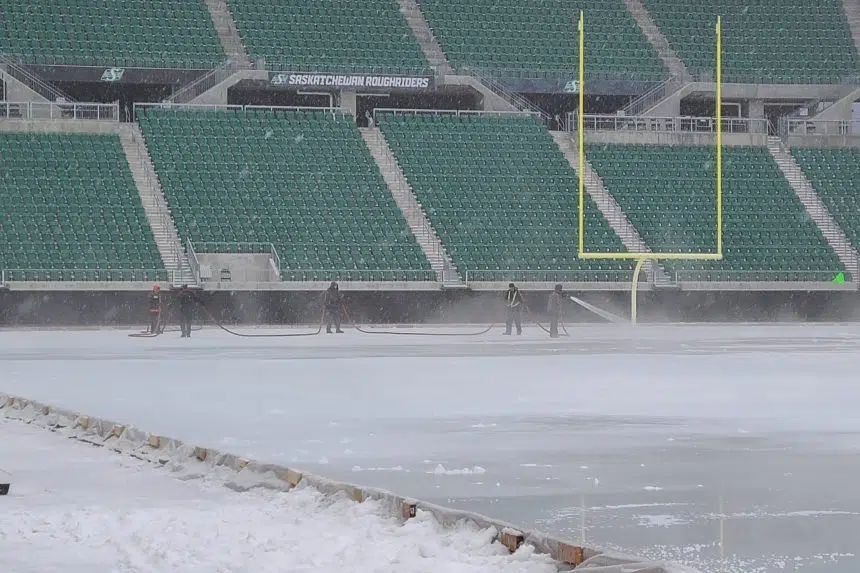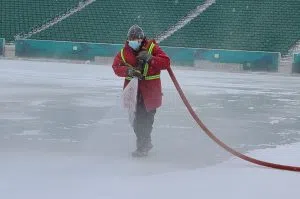People will once again be able to lace up their skates and head to Mosaic Stadium this winter.
Iceville is returning after a successful first run in 2021.
“We always talk about trying things and recognizing that sometimes they don’t work. But Iceville really did, not only because we were all looking for excuses for something to do (but) it was outdoor and we could control it,” Tim Reid, the CEO of Regina Exhibition Association Limited, said Friday.
“We want this to become an annual tradition. People love coming to the stadium. They love the experience of walking through these doors, they love the fact that this asset is owned by everybody who calls Regina home and we have to make it a 12-month asset.”
There will be about 1,200 cubic metres of water used to make up the ice surface this year. That works out to about 317,000 U.S. gallons of water — just about half the amount that goes into an Olympic-sized swimming pool.
“There’s very few places in Canada that can actually achieve this. Our team lay the decking that we do for concerts, they put down a vapour barrier essentially to catch the water, they build up about 10 inches of board structure around the perimeter of the ice and then we borrow the fire hoses from the fire department,” Reid said.
“We go out as often as we possibly can, normally overnight because that’s when it freezes, and we flood all night.”
Reid said they have been loaned two extra ice resurfacing machines this year to help keep all ice surfaces in shape, including at the Brandt Centre and Co-operators Centre as well as Iceville.
Scott Manson, director of site and facilities with REAL, said the organization has a better idea of how to schedule its crews and flooding times this year. There will also be 25 per cent less water used in 2022 to make the ice surface.
“The weather is very co-operative this year,” Manson said. “We put more time and effort into a better seal underneath the decking so we don’t lose near as much water as we saw last year.
“Because the field has a bit of a crown to it for drainage with rain, what you see out here is our outside edges will have about seven inches of ice, but right down the centre of the field will be about two or three inches of ice.”
Unlike in 2021, there will be a $5 fee per skater this year to use the ice.
“We always committed this would be an initiative that wouldn’t lose money on behalf of the taxpayer and last year we were very fortunate that it broke even,” Reid said. “Last year we saw 190,000 people wanting to sign up and we felt there had to be investment on behalf of the skater to show up.”
Reid said there is expected to be anywhere between 40,000 and 45,000 timeslots available.
“We realize demand will probably greatly outpace that. So we wanted to put a fee that if you spend your five bucks, you’ll likely go for a skate. We didn’t want to have people burn those times that are very valuable where someone else may want to,” Reid said.
Reid said about six per cent of ice times in 2021 went unused due to people just not showing up.
Refunds will be given out if the temperature drops below -25 C without wind chill.
“We hold everyone’s tickets for an option for a refund or we will book you another time to skate,” Reid said.
Registration for ice times began Friday. Iceville is expected to run from Dec. 31 to Feb. 3, with the ice surface to become a part of Frost Festival. If the weather allows it, Iceville could continue after the festival as well.
New Year’s Eve, which is the first day Iceville will be open, will conclude with a fireworks display at Mosaic Stadium. People are invited to skate — with the fee still in place — but it will be free to sit at Mosaic Stadium and watch them.
Due to current public health orders, proof of a negative COVID-19 test from within 72 hours of the skating time or proof of vaccination will be required. Masks will also have to be used while indoors at Mosaic Stadium.












